
Fontana Pretoria In Palermo Sicily Italy Stock Photo Download Image
Francesco Camilliani's most notable work by far is the Renaissance fountain in the Piazza Pretoria in Palermo, the Fontana Pretoria. This piece was originally commissioned for the garden of the villa outside Florence of Luigi Alvarez de Toledo, son of the viceroy Don Pedro Álvarez de Toledo and brother-in-law of Cosimo I de' Medici ; it was.

Fontana Pretoria (Pretoria Fountain) Palermo The World of Sicily
Top ways to experience Fontana della Vergogna (Fontana Pretoria) See all. Recommended Tours & Sightseeing Walking & Biking Tours Shore Excursions. Walking Tour and street food Tour Palermo. 337.. Sicily Horse Tours. 206. Ranches • Horseback Riding Tours. 2023. Castello di Punta Troia. 173. Castles. 2023. Chiesa di San Filippo Apostolo. 283.
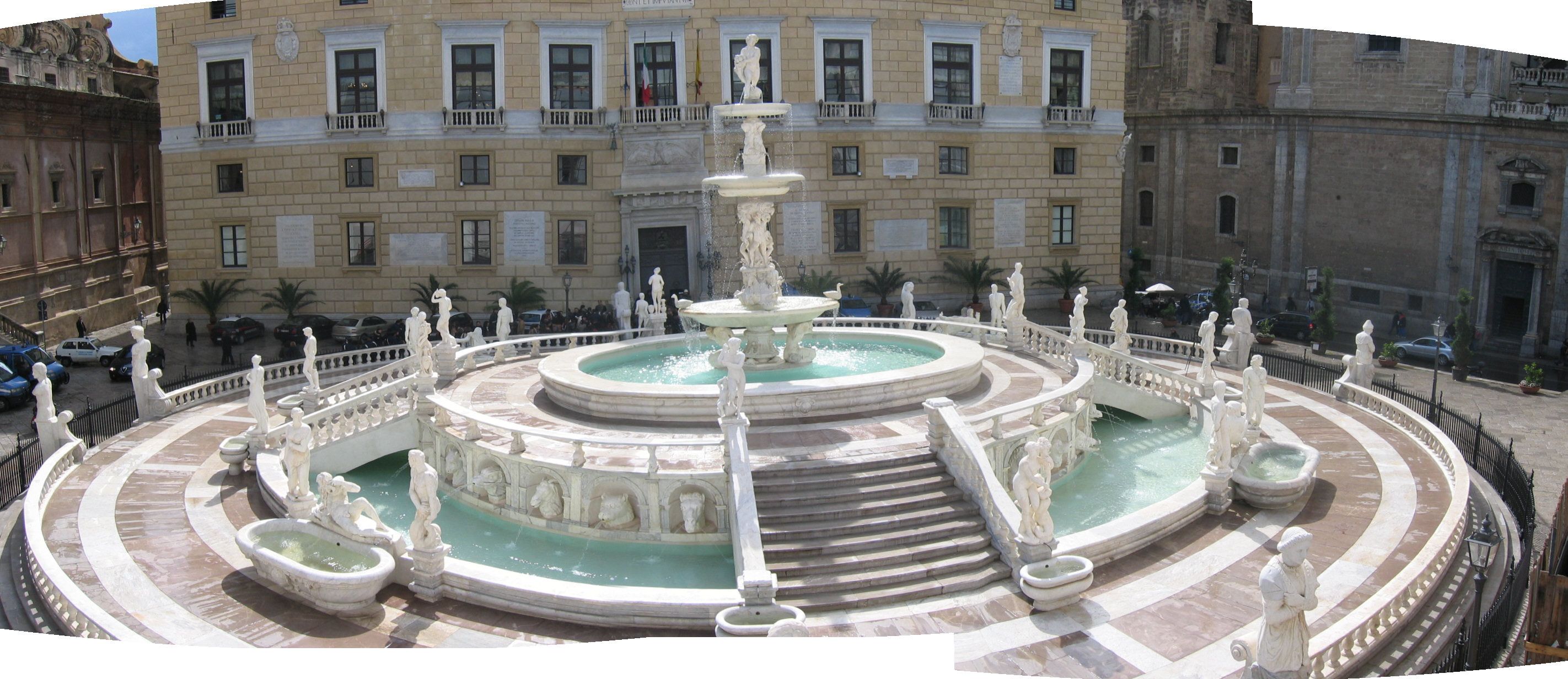
Free photo Fontana Pretoria Architectural, Pretoria, Landmark Free
Fontana Pretoria. Fontana Pretoria: Our most recommended tours and activities. 1. Palermo: NO Mafia Walking Tour. Discover the top sights in Palermo from a unique angle on a guided walking tour. Every stop is a chance to pause for reflection on the realities of the Mafia and consider the civic movement against Mafioso power.
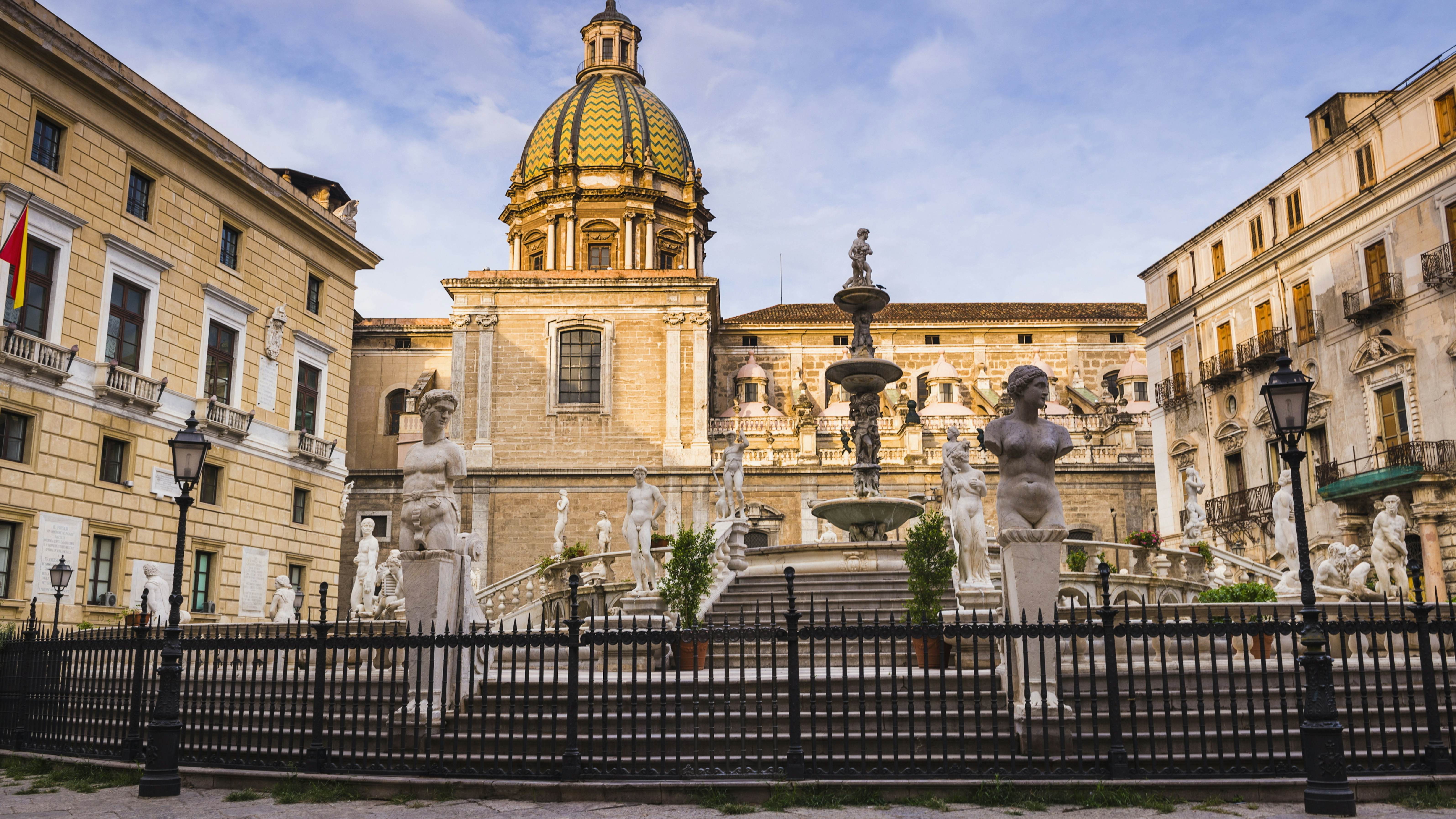
Fontana Pretoria , Italy Attractions Lonely
The spectacular Fontana Pretoria is the centerpiece of Palermo's large Piazza Pretoria. Created by the Florentine sculptor Francesco Camilliani for a private Tuscan villa, the fountain was acquired by Palermo in 1574.. Capital of Sicily, Palermo is a city steeped in history and impressive architecture, with secrets hidden around every.

Fontana Pretoria in Palermo, Sicily, Italy Editorial Stock Photo
It will absolutely amaze you. Definitely a must-see in Palermo! Today the palace is home to Sicily's parliament. 3. Take Pictures at the Fontana Pretoria . If there is one place in Palermo that you'll want to photograph from all angles is the gorgeous Fontana Pretoria (Pretorian Fountain), located right in the heart of Piazza Pretoria.

Fontana Pretoria in Palermo, Sicily Stock Photo Image of
The Praetorian Fountain is a monumental fountain of Palermo. It is located in the heart of the historic centre and represents the most important landmark of Piazza Pretoria. The fountain was built by Francesco Camilliani in the city of Florence in 1554, but was transferred in Palermo in 1574. Therefore, in Palermo some adjustment were necessary. The work of assembling was made by Camillo.

Fontana Pretoria Visit Sicily Scopri la Sicilia
Palermo, Sicily walking tour - Fontana Pretoria (Fountain of Shame) - The Praetorian Fountain, a monumental fountain located in Piazza Pretoria in the histor.

Fontana Pretoria in Palermo, Sicily, Italy Stock Photo Image of
Browse 283 authentic fontana pretoria stock photos, high-res images, and pictures, or explore additional castelbuono or cefalù stock images to find the right photo at the right size and resolution for your project.

Fontana Pretoria, Piazza Pretoria, Palermo, Sicily Stock Photo Alamy
Italy, Europe. Palermo. Fringed by imposing churches and buildings, Piazza Pretoria is dominated by the over-the-top Fontana Pretoria, one of Palermo's major landmarks. The fountain's tiered basins ripple out in concentric circles, crowded with nude nymphs, tritons and leaping river gods. Such flagrant nudity proved a bit much for Sicilian.
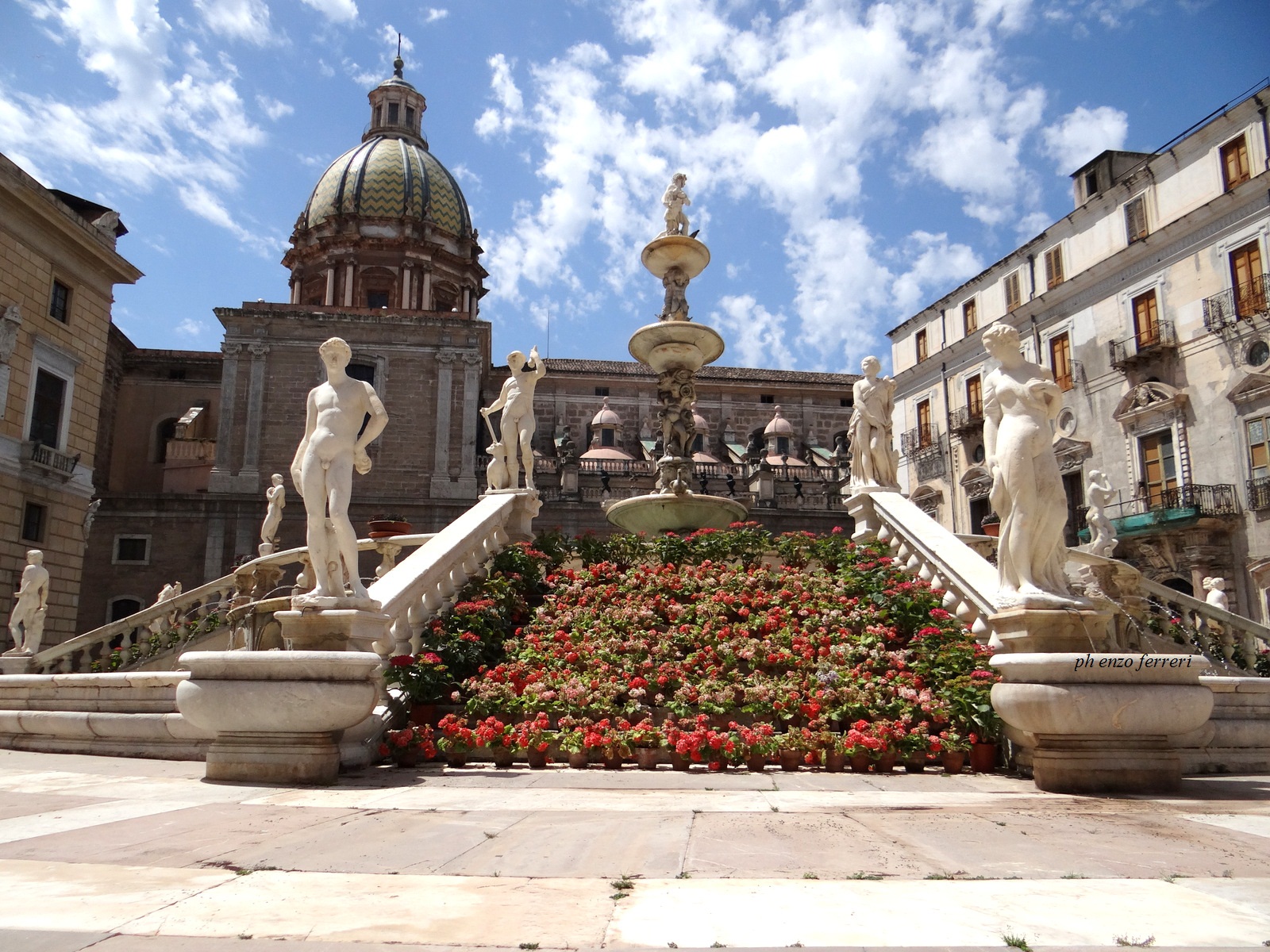
Free photo Fontana Pretoria Architectural, Pretoria, Landmark Free
The Fontana Pretoria in Palermo: Fountain of Shame The impressive fountain in late Renaissance style has an eventful history. Originally commissioned for a private Tuscan villa in the 16th century, the imposing structure found its destination in Palermo.. The capital of the Sicily region was named Italian Capital of Culture in 2018 by the.

The Praetorian Fountain (Italian Fontana Pretoria) is a monumental
Fontana Pretoria (1554-55) - also called the Fountain of Shame. Fontana Pretoria (1554-55), also known as the Fountain of Shame on Piazza Pretoria near the Quattro Canti intersection in Palermo. Goethe was appalled when he visited Palermo in 1787. Photo: Per-Erik Skramstad / Wonders of Sicily . Detail of a statue at Fontana Pretoria in Palermo.
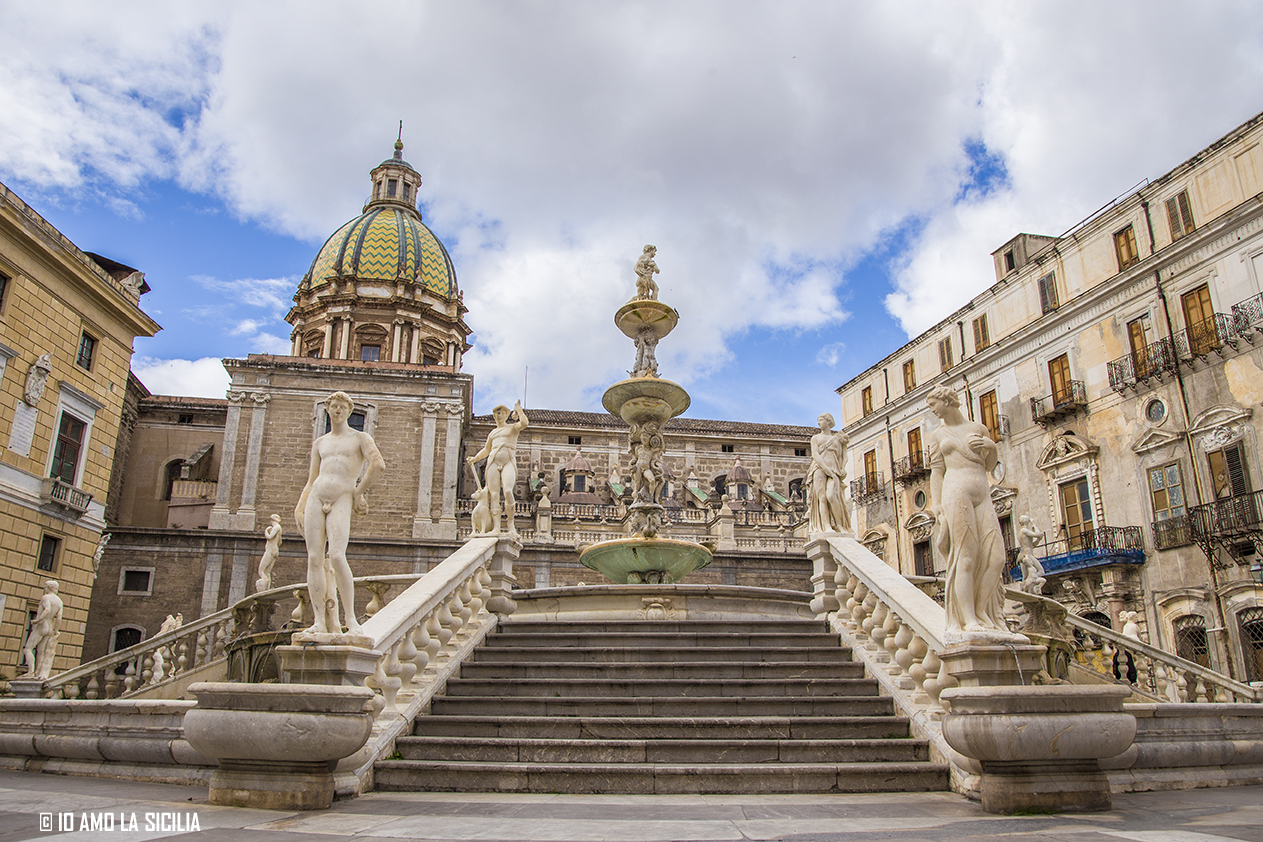
La Fontana Pretoria di Palermo storia, leggende e significato delle statue
One of the statuettes guarding the ramps is Ceres, the classical patroness of Sicily, depicted with a horn of plenty. The fountain is floodlit at night, making it a 24-hour sight. Shocking, Outrageous, Disgraceful!-- When the Fontana Pretoria was first unveiled in 1575 at Piazza Pretoria, the outcry was so loud it could practically be heard.
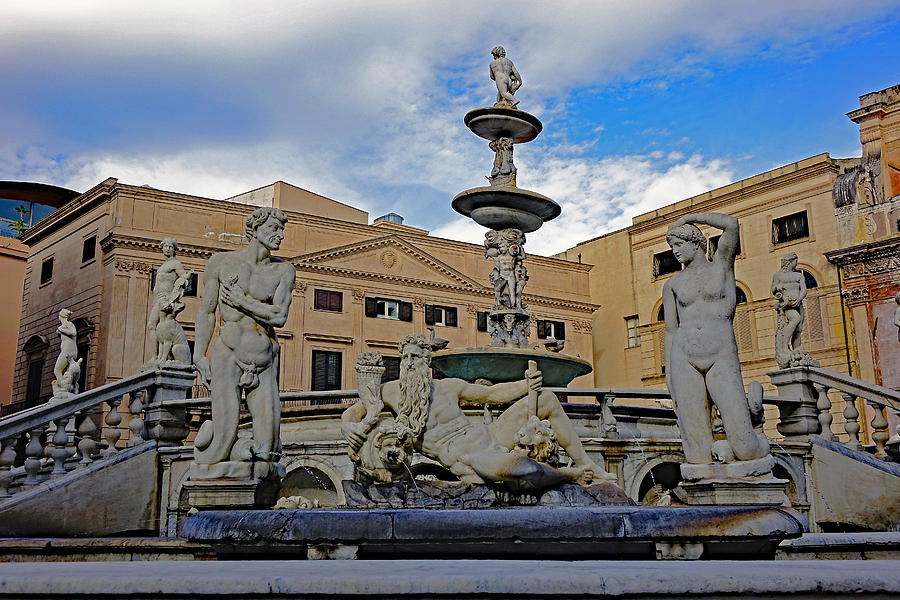
The Fontana Pretoria In Palermo Sicily Photograph by Richard Rosenshein
The Praetorian Fountain (Italian: Fontana Pretoria) is a monumental fountain located in Piazza Pretoria in the historic center of Palermo, region of Sicily, Italy.The fountain dominates the piazza on the west flank of the church of Santa Caterina, and is one block south of the intersection of the Quattro Canti.The fountain was originally built in 1544 in Florence by Francesco Camilliani, but.

La Fontana Pretoria de Palermo
Designed and crafted by the Florentine sculptor Francesco Camilliani, Fontana Pretoria was commissioned by a Spanish nobleman Don Luigi Toledo.. Fontana Pretoria, Palermo, Sicily - Fantastic Fountains . 2273 Dibyendu Banerjee 24/04/2020 Designed and crafted by the Florentine.
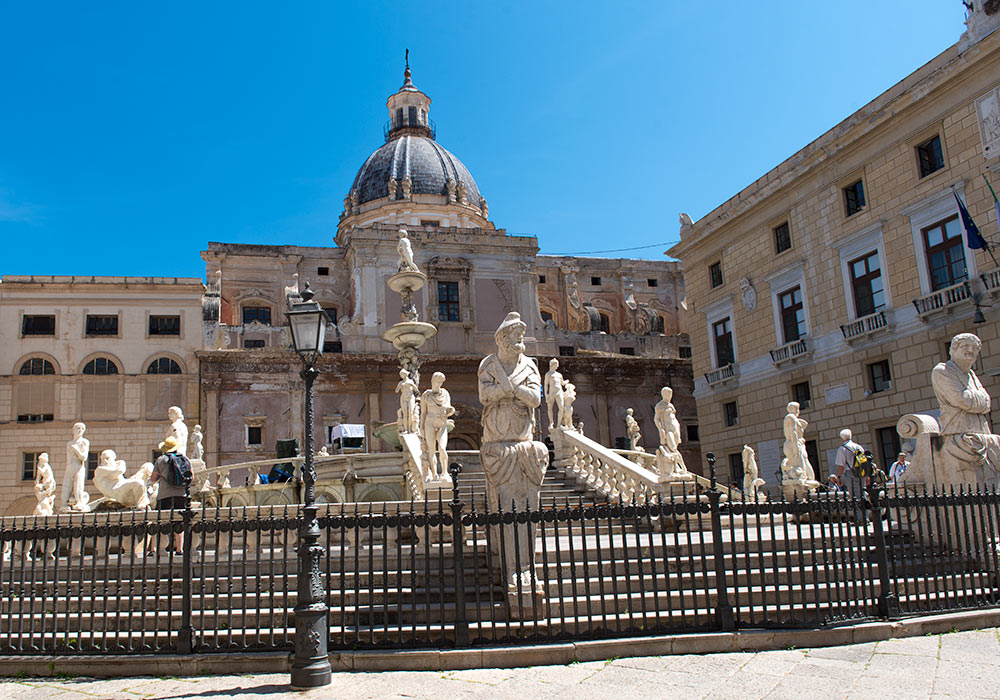
Fontana Pretoria (155455) the Fountain of Shame Fontana della
The Palermitans call it Fontana della Vergogna (Fountain of Shame). Goethe visited Sicily in 1787, and was appalled when he saw the fountain, and even more appalled when he later visited Villa Palagonia in Bagheria. Fontana Pretoria is a perfect place for photographers to experiment with composition. Mixed creatures. Relief at Fontana Pretoria.

1554 Praetorian Fountain Fontana Pretoria by Francesco Camilliani
Fontana Pretoria. Close to Quattro Canti is the Fontana Pretoria, the most impressive fountain in a city of impressive fountains. This fountain was actually originally constructed in Florence and brought to Palermo's Piazza Pretoria in 1574 — a painstaking process that involved 644 pieces.